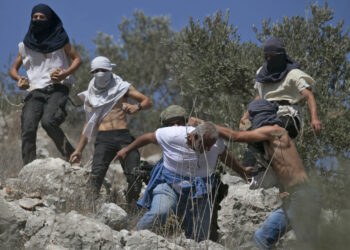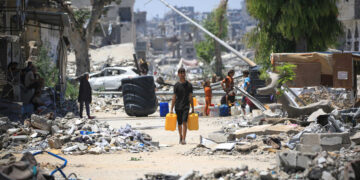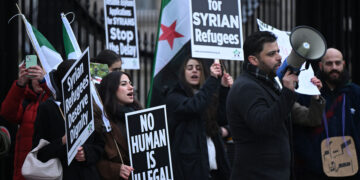Matt Schwartz is the Chief of Staff and Organizational Learning at the Global Center on Cooperative Security.
Franziska Praxl-Tabuchi is the Director of Civic Space and Multilateral Security Policy at the Global Center on Cooperative Security.
Twenty-three years after the terrorist attacks of 9/11, the effects of the so-called global war on terror live on, even if the United States has ended its long wars in Afghanistan and Iraq. Some of the norms and discourse of the "war on terror" have been institutionalized into international bodies like the United Nations, which has adopted a vast corpus of extraordinary legal and administrative measures to combat terrorism and violent extremism. Counterterrorism has become so embedded at the U.N. that some NGOs have begun referring to it as the "fourth pillar" of the U.N.'s mission, alongside the three founding pillars in the U.N. Charter of peace and security, human rights and development.
But the growing centrality of counterterrorism in the work of the U.N. has raised alarm bells among human rights defenders, as states are openly using U.N. resolutions, policy guidance and technical assistance to justify their human rights violations, including frequently targeting activists, civil society groups—and even the U.N. itself.
The U.N. Security Council has adopted more than 50 resolutions since 2001, often comprised of overly broad and vague provisions while lacking enough emphasis on human rights protections. In addition to the many resolutions and guidance documents produced by the more than 40 U.N. entities involved in the U.N.'s counterterrorism architecture, the U.N. Office of Counter-Terrorism (UNOCT) has quickly grown in stature, following a significant uptick in funding. Since its establishment in 2017, UNOCT has received over $340 million in voluntary contributions—primarily from Qatar and Saudi Arabia—raising considerable concerns about political influence over the U.N. counterterrorism agenda and questions around the allocation, or misallocation, of much needed resources from other parts of the U.N., most importantly human rights and humanitarian entities and agencies.
The lack of international legal definitions and general subjectivity of concepts like terrorism and violent extremism are particularly useful for repressive and authoritarian states. In popular discourse, they are drawn on to stamp their subjects as particularly deserving of social fear, revulsion and outrage. In the expanding field of scholarship on terrorism and violent extremism, these concepts are often used to justify the application of analytical rules arbitrarily distinct from those used to analyze other manifestations of political violence. And in public policy, terrorism and violent extremism are frequently invoked to justify the formation of specialized regimes of exceptional legal and coercive measures targeting "terrorist threats" and "populations vulnerable to radicalization."
Over the past year, the Global Center on Cooperative Security, an international NGO, and Rights and Security International, a London-based human rights organization, consulted with civil society organizations around the world to understand whether, how and under what conditions civil society should engage with the U.N. to address these issues and demand accountability for state abuses of counterterrorism measures. Two underlying questions pervaded the discussions and resulting report. First, by engaging with the U.N. and its member states on counterterrorism, are civil society groups ultimately legitimizing a policy agenda that has led to the silencing of civil society activists, the punishing of dissent, the limiting of free expression and other violations of fundamental rights? And if so, what can U.N. counterterrorism entities do to protect civil society from repression that is ostensibly justified in the name of counterterrorism?
Counterterrorism has become so embedded at the U.N. that some NGOs have begun referring to it as the "fourth pillar" of the U.N.'s mission.
- Matt Schwartz and Franziska Praxl-Tabuchi
Israel's ongoing assault on Gaza is the latest and perhaps most blatant example of a state justifying human rights abuses under the claim of countering terrorism. With the horrific October 7, 2023 attack by Hamas and other Palestinian armed groups as its justification, Israel launched a war of collective punishment, including starvation, on the entire population of Gaza, while also intensifying repression and cementing Israeli rule in the occupied West Bank. Though the enormity of Israel's onslaught in Gaza may be exceptional, the Israeli response is part of a long pattern of violence and repression that has heavily drawn on a counterterrorism justification.
In fact, counterterrorism has been integral to Israel's regime of occupation and apartheid for more than half a century. Such measures have not only enabled the Israeli state to treat Palestinians collectively as a "suspect community" against which violence and discrimination can be perpetrated with impunity, they have also served in suppressing Palestinian civil society. Israel has targeted Palestinian NGOs precisely because of their work exposing human rights abuses and mobilizing national and international efforts to demand accountability, dignity and equal rights.
In 2022, Israeli authorities raided the West Bank offices of seven prominent Palestinian civil society groups and shuttered them on the basis of spurious "terrorism" charges, threatening some of their directors with prosecution and imprisonment if they continue their work. Last year, Israel passed a law criminalizing "consumption of terrorist publications," granting the justice minister broad powers to determine which publications it applies to. In Gaza, where the Israeli military has killed an unprecedented number of Palestinian journalists over the past year, Israel openly alleges their association with Hamas as justification, smearing reporters as terrorist accomplices and attempting to undermine any critical coverage of its war.

Even the U.N., which has helped enable the proliferation of this counterterrorism agenda, has run afoul of Israel's terrorism justification for practically anything. UNRWA, the U.N. agency that provides critical relief and development assistance in the Palestinian territories, including education and health services, has been the target of an international smear campaign by Israel, with claims—still never substantiated—that UNRWA had colluded with Hamas and its employees had participated in the October 7 attacks. Israel's campaign against UNRWA led many countries to suspend their funding of the agency, including the United States, its biggest donor, even when the charges against UNRWA were shown to be baseless. In Gaza, the suspension of UNRWA aid, as many warned, has hastened a man-made famine, while at least 197 UNRWA workers have also been killed. A bill designating UNRWA a "terrorist organization" is progressing through the Knesset, with far-right Israeli politicians explicitly pushing to abolish UNRWA.
Despite the International Court of Justice ordering Israel to protect Palestinians from what it called the "plausible" risk of genocide, and other urgent calls about the humanitarian horrors in Gaza—including a detailed report by U.N. special rapporteur Francesca Albanese on how Israel's war has crossed the threshold into genocide—many Western governments are increasingly restricting speech over the war in the name countering terrorism and violent extremism. In the United Kingdom, for example, a new government definition of "extremism" is contributing to growing fears of a crackdown on pro-Palestine campaigners (as well as climate activists). Germany has been at the forefront in the European Union in taking unprecedented steps to silence expressions of solidarity with Palestine, including those made by Jewish activists, charging calls to end genocide and apartheid as tantamount to antisemitism and the "glorification of terrorism." Meanwhile, in the U.S., counterterrorism measures are returning to their roots with a renewed focus on Palestine, through a new wave of surveillance efforts and blacklisting of Palestinian and Palestine solidarity groups on campuses that are helping drive popular calls for a cease-fire.
But Palestine is hardly alone here. In Myanmar, the military has used the framework of counterterrorism to suppress political critics, journalists and human rights defenders and silence opposition to its ethnic cleansing campaigns against Rohingya Muslims. Counterterrorism measures have also helped undergird China's campaign to "forcibly assimilate" Uyghurs and other Turkic Muslim minorities in Xinjiang province.
Beyond providing cover for war crimes and crimes against humanity, states often invoke counterterrorism in pursuit of raw power against any and all critics. Following years of targeted repression against the country's LGBTQ+ population, Russia's highest court outright criminalized what it called the "international LGBT movement" under "anti-extremist" measures in late 2023. This past March, two employees of an LGBTQ+ club in Russia were arrested on suspicion of being members of an "extremist organization," in the first such arrests since the ruling. In Saudia Arabia, meanwhile, advocates for women's' rights continue to be prosecuted under sweeping anti-terrorism measures, most recently activist Manahel al-Otaibi, who was given an 11-year prison sentence for her social media posts and clothing. In response to concerns issued by U.N. human rights experts, Saudi authorities insisted that she was found guilty of "terrorism offenses." The list could go on.
Israel's ongoing assault on Gaza is the latest and perhaps most blatant example of a state justifying human rights abuses under the claim of countering terrorism.
- Matt Schwartz and Franziska Praxl-Tabuchi
When it was founded in 1945, the United Nations declared its promise to operate "for the people." Yet nearly 80 years later, civil society and community groups seem to be on the losing end of U.N. measures that have encouraged states to adopt sweeping counterterrorism policies that have often been used to justify discrimination and repression. In many corners of the world, civil society activists are increasingly unable to operate without fear of reprisals.
Imbalances of power have kept the U.N. in a constant state of political paralysis, incapable of living up to its values to promote and protect civil society. There is once again more debate about whether the world body's relevance and legitimacy are irrevocably fading.
Civil society must be able to trust that the U.N. prioritizes human rights and aims to protect civic space from repression and intimidation ostensibly justified under counterterrorism. To effectively defend human rights while addressing conflict and violence, the U.N. must recognize civil society as an indispensable contributor to and valuable critic of the formulation, implementation and evaluation of U.N. peacebuilding and violence-prevention efforts, including counterterrorism. That means engaging civil society as an equal partner and ensuring that the U.N.'s counterterrorism-related activities don't just meet the needs of its member states but align with the rights they are supposed to protect.
The views expressed are those of the authors and do not necessarily reflect those of the Global Center, RSI, their respective boards and sponsors, or the project advisory committee for the Scoping Report.






































